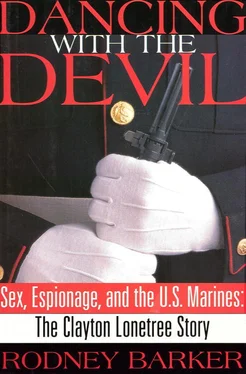His retraction was not taken seriously, however, because even though some people under duress admitted to things that later turned out to be true, Bracy had not been locked in a room and grilled day and night; and contradicting his version of events was the testimony of two respected NIS polygraphers.
But when William Kunstler heard what Bracy was saying, having already decided on a strategy of attacking the credibility of the Naval Investigative Service, and recognizing that Bracy’s accusations of NIS misconduct paralleled Lonetree’s tell-me-a-lie experience, he seized on the situation, pointing to a pattern of coercive techniques and deception used in interviews and polygraphs, and launching a ferocious campaign of NIS vilification. Lonetree was “the scapegoat of a botched-up investigation,” he thundered, predicting the case against his client was destined to fall apart because it was “unprovable.”
Of course, it would only stay unprovable as long as Bracy steadfastly denied conspiring with Sergeant Lonetree, and out of concern that the young military attorney assigned to defend Bracy, Capt. Brendan Lynch, would cave under pressure and convince Bracy to take a deal and testify against Lonetree, Kunstler made a series of phone calls. One was to Benjamin Hooks, executive director of the NAACP, a personal friend from previous civil-rights cases; the other was to Arnold Bracy’s parents. The picture he put out was that a black man was in danger of being sold down the river, and the upshot was that the NAACP decided there was a racial injustice in the making and it would get involved.
As it turned out, Kunstler was right in at least one respect: A deal was being offered to Bracy’s military attorney. But being just a captain, Lynch felt he was in over his head, and instead of accepting or rejecting it, he put in a request for help from a higher-ranking judge advocate. This was how Lt. Col. Michael Powell, SJA at the 4th Marine Division, headquartered in New Orleans, came to be detailed to the case.
Powell had eight years as a prosecutor and two on the defense side. He was a top-flight trial attorney. He was also a maverick, more interested in enjoying his career in the military than he was concerned about rank. Brash, he had an exceedingly high opinion of his own judgment. As he explained in an interview with a reporter, “What happens is I am frequently in a position where I tell people in advance what’s happening, but they don’t believe me. Then it turns out I’m right and they get pissed off at my I-told-you-so grin.”
Before he ever met Arnold Bracy, when he’d first heard about the case, Powell smelled a rat. He found it hard to believe that the KGB would trust Marines enough to risk sending an agent into the secure areas of the American Embassy. What were they going to do if he got trapped in there? Send in a rescue team? The potential for international embarrassment was too great, he thought.
After he had received copies of Bracy’s three statements and read them, the odor in the air was even stronger. There were things in there that looked strange, shoddy, rushed. Specifically, there were misspellings and words crossed out. Normally when that was done, the suspect initialed the changes, but here the agent’s initials were penned in. That was not necessarily an incriminating point, but it raised the question why Bracy’s initials weren’t there.
In the second statement, where Bracy allegedly said he slept with the Russian girl, it appeared to him that there were racial overtones to their interrogation. The agents seemed to be more interested in the fact that a black man slept with a white girl than anything else.
The third statement dealt with the espionage charges, and reading it Powell found himself thinking, Marine security guards don’t have that kind of access. Not only that, there was something troublesome about Bracy’s signature. Only when he stacked the pages together and held them up to the light did Powell realize what it was that bothered him. They lined up almost perfectly. Yes, Bracy had signed the bottom of each page, but the placement of his signature suggested to him that rather than reading each page and signing, the agents had been afraid he wouldn’t sign them if he read what was written, so they had peeled the bottom corner back and told him to sign there.
Powell drove up from New Orleans, arriving late in the day. The minute he walked in the door of Lejeune Hall to report in, before he’d had a chance to meet with either Captain Lynch or Arnold Bracy, he was approached by Maj. Frank Short, coprosecutor on the Lonetree case. “We’d like to negotiate with Bracy. Nobody has a hard-on for him. The guy we want is Lonetree.”
“Whoa,” Powell said. “I haven’t even met my client yet. I can’t agree to anything. I won’t close the door on the offer if it will help him, but give me a chance to talk with him first.”
After visiting Arnold Bracy in the brig at Quantico and talking with him for hours, after learning more about his family background, and after hearing Bracy’s version of what happened in the motel rooms at Twentynine Palms, Lieutenant Colonel Powell felt the case against his client was going nowhere.
Arnold Bracy had grown up in Queens, New York, but he was no street-smart kid from the projects who’d joined the Marines as an alternative to jail. He was a bright, articulate young man, college material, who had opted for the Corps because he didn’t want to impose a financial burden on his parents. Until this, he had compiled an impeccable record.
As for his character, Powell would never forget the day he and Bracy had been talking in the secure facility for several hours, and they took a break. In the hall outside, there was a candy machine, and while Bracy bought a candy bar, Powell lit a cigar. As he was standing there puffing and swearing about something, he looked over and saw that after Bracy took the wrapper off he paused, closed his eyes, and murmured to himself. When he was done and had taken a bite, Powell asked him, “Corporal Bracy, what were you just saying to yourself?”
“I was saying the Lord’s grace,” Bracy replied.
Arnold Bracy, it turned out, had all but grown up in the Calvary Full Gospel Pentecostal Church, where his parents were Sunday school teachers, and his religious orientation prohibited him from drinking, smoking, swearing, or engaging in premarital sex.
When Lieutenant Colonel Powell asked his client to tell him the truth of what had happened in Moscow, Bracy’s account admitted to a petty infraction and a mistake in judgment, but no more. He said he had been friendly with the female Russian cook at the embassy. He acknowledged that she had approached him and told him she was being pressured to seduce him. He even allowed that foolishly he had gone to the diplomat’s home, where the cook worked as a maid, to see her and had not reported the contact. But he vehemently denied sexual intimacy was part of their relationship, and as for his alleged espionage admissions to the NIS agents, he said they were a mix of half truths, fabrications, and lies that he had been coerced into signing.
Powell believed his client. And over the following weeks nothing happened that would change his mind. To the contrary, the defense would benefit from independent investigative efforts by the Naval Investigative Service to assess the truthfulness of key parts of Bracy’s allegations, because agents would determine that in every significant detail it was factually impossible. There were doors and devices, which Bracy never mentioned, that would prevent a Marine from entering the communications center. There were alarms that the Marines were unaware of that would have registered intrusions if Bracy and Lonetree had allowed Soviets to wander about inside the embassy; these alarms had not sounded. The logs were checked, and the guard duty assignments as recorded did not allow for the nighttime collaborations described in Bracy’s confession.
Читать дальше












